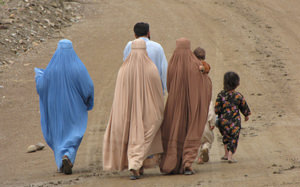Burqas Do Not Justify War
When the U.S. initially invaded Afghanistan, the terms “women’s rights” and “protection” were thrown around as justification for war. More than a decade later, it’s clear little has been done to promote women’s rights in Afghanistan, and the conditions created by military intervention have only worsened the prospects for equality.
When the U.S. initially invaded Afghanistan, the terms “women’s rights” and “protection” were thrown around as justification for war. More than a decade later, it’s clear little has been done to promote women’s rights in Afghanistan, and the conditions created by military intervention have only worsened the prospects for equality. Not only does associating women’s rights with the “West” have detrimental effects on a community that is resistant toward its imperial invaders, but the war itself has wreaked havoc on the daily lives of women.
Feminist theorist Zillah Eisenstein writes in Al-Jazeera:
There is a complex set of realities for women in Afghanistan. Poverty is overwhelming and getting an education a constant struggle. Afghan women continue to suffer poor nutrition, lack of education, prenatal and preventative health care, and suffer the highest infant mortality rate in the world. Any women’s rights agenda must first address these issues that are part and parcel with a ruined war economy and a devastated countryside.
Nevertheless, many Afghan women also have been activists on their own behalf long before the US invaded. They have been determined to fight for their rights – to their bodies and their minds, as they understand this in a myriad of ways.
…Many Afghan women activists say they are tired of being saved by others. The Russians, the Taliban and now the US government have all claimed women’s “protection” as their agenda, to only soon forget or redefine this determination and turn it towards their own use. And for Afghan women, like others elsewhere, there is a huge difference between “protection” and “equality”.
Peace is an essential component of an environment in which a women’s agenda can be effectively promoted. The Taliban and Afghan men cannot simply be dismissed as misogynistic patriarchs without taking into consideration how the U.S. military has contributed to the problems women face in Afghanistan.
As Eisenstein reminds us, “Women from across the globe demand their rights in their own form, and in other than western ways. … Many Afghan feminists believe in the democratic promissory within Islam as it is articulated by women themselves.”
Besides, how can the U.S. presume to tell Afghan women how to assert their rights when there is still a long war to fight for such liberties at home?
—Posted by Natasha Hakimi
Your support matters…Independent journalism is under threat and overshadowed by heavily funded mainstream media.
You can help level the playing field. Become a member.
Your tax-deductible contribution keeps us digging beneath the headlines to give you thought-provoking, investigative reporting and analysis that unearths what's really happening- without compromise.
Give today to support our courageous, independent journalists.






You need to be a supporter to comment.
There are currently no responses to this article.
Be the first to respond.